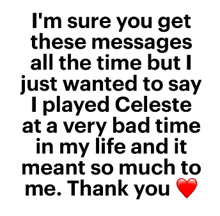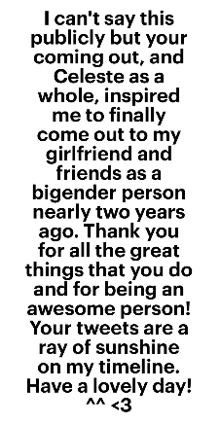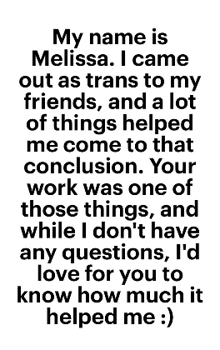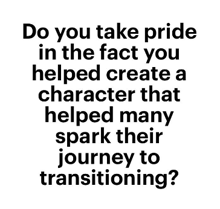The woman behind the video game behind the movement
Newsletter editor Rachel here
When people ask me what kind of music I listen to, it feels like a trap. There is no way to answer this question without being judged for my obscure taste in music.
For example, my ongoing obsession with the soundtrack to the indie video game, Celeste, a 2D platformer released in 2018.
I’m obsessed with the score and the video game because of one woman, Maddy Thorson.
Maddy is the programmer and writer of Celeste and an absolutely fascinating person.
The most interesting thing to me about Maddy isn’t that she was named Forbes 30 under 30 in 2014.
Or that she’s founded several successful gaming companies.
What fuels my crush on this amazing person is how she advocates for trans rights through the lens of her video game, Celeste. The role that her very creation played in her own journey of realizing and honoring her identity. And the stand that she's taken since to protect her privacy and her humanity, while also creating something that is shifting so many people's perceptions and cutting through so much disinformation of what it means to be transgender at a crucial time in our country.
I’ll explain. Celeste tells the story of a girl named Madeline who struggles with anxiety and low self-esteem. Throughout the story, she grows as a character, eventually learning how to love and see herself clearly. As she journeys through this fictional world, she journeys into a deeper understanding of herself.
Maddy created the game Celeste at a time when she didn’t consciously realize that she or the main character in the game, Madeline, was trans. As she phrased it:
"Well, yeah, of course she is [transgender]. This feels painfully obvious to a lot of (mostly trans) people, and likewise it feels painfully obvious to me too, in retrospect. It has also become painfully obvious to me that I, myself, am trans. But these are things that I was not aware of during the development of Celeste, where I was writing Madeline and speaking from her perspective. Creating Celeste with my friends helped me reach the point where I could realize this truth about myself. During Celeste’s development, I did not know that Madeline or myself were trans. During the Farewell DLC’s development, I began to form a hunch. Post-development, I now know that we both are."
The game made waves. And not just because of its incredible design and score. But because this was the most sensitive and well-thought-out game to address issues around gender and anxiety and mental health– maybe ever.
After its release and success, gamers began to debate the gender identity of the main character, Madeline. While obvious to many, to some overly sensitive man-children living in their mom’s basements, this came as very upsetting news.
What I love is what happened next. Maddy (the game designer) went to bat for the rights of Madeline (the fictional character). Essentially telling people to back off and check themselves before demanding background about someone’s gender identity. Something that everyone should definitely do in real life, and hey, maybe practice with a fictional character.
This is why representation in movies and books and games of all kinds of people is so important. This is what Ellen did. What Will & Grace did.
As Maddy wrote:
“Trans people shouldn’t be forced to publicly identify as trans in a world that is often hostile to them, and they shouldn’t be reduced to their transness. They should be allowed to live their lives how they want, and everyone should be free to explore their gender identity without feeling pressure to place themselves into simplistic categories for the benefit of others.”
She is defending the right to privacy for her video game character, for herself, and for every other trans person who feels scrutinized by a culture that doesn’t understand them.
Maddy claps back at those who feel like the trans undertones of the game should have been more apparent.
“Maybe if you’re a cis person and you personally relate to Madeline, you shouldn’t feel like we pulled one over on you. Instead, you could take this as evidence that trans and cis feelings aren’t so different, that the chasm between transness and cisness isn’t such a wide gulf.”
I could honestly quote her entire article because it’s brilliant and eloquent, and she goes into more detail about her journey. I hope you will take a few minutes to read about these incredible people– one a fictional character, and one irl, but both are making a safe space online for thousands of people. You can read more here:
Is Madeline Canonically Trans?
In the past four years, Celeste has created a growing niche on the internet for trans gamers to feel empowered and represented. There is so much love online for Maddy and for Madeline.
Trans and questioning fans of the game have reached out to share just how influential their stories have been for them. |
 |
 |
 |
 |